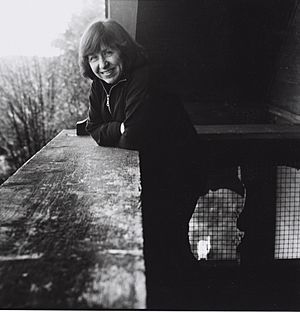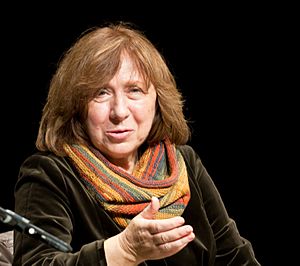Svetlana Alexievich facts for kids
Quick facts for kids
Svetlana Alexievich
|
|
|---|---|

Alexievich in 2024
|
|
| Native name |
Святлана Аляксандраўна Алексіевіч
|
| Born | Svetlana Alexandrovna Alexievich 31 May 1948 Stanislav, Ukrainian SSR, Soviet Union (now Ivano-Frankivsk, Ukraine) |
| Occupation | Journalist, oral historian |
| Language | Russian |
| Citizenship | Belarus |
| Alma mater | Belarusian State University |
| Notable awards | Nobel Prize in Literature (2015) Order of the Badge of Honour (1984) Order of the Arts and Letters (2014) Friedenspreis des Deutschen Buchhandels (2013) Prix Médicis (2013) Belarusian Democratic Republic 100th Jubilee Medal (2018) |
| Signature | |
 |
|
Svetlana Alexandrovna Alexievich (born 31 May 1948) is a writer from Belarus. She is known for her books that tell real stories. She writes about important events in history by collecting interviews from people who lived through them. This way of writing is called "oral history."
In 2015, she won the Nobel Prize in Literature. She was given the award for her "polyphonic writings," which means her books include many different voices and stories. Her work shows the suffering and bravery of people in our time. She is the first writer from Belarus to receive this special award.
Contents
Early Life and Career
Svetlana Alexievich was born in a town called Stanislav (now Ivano-Frankivsk) in Ukraine. Her father was Belarusian and her mother was Ukrainian. She grew up in Belarus.
After finishing high school, she worked as a reporter for local newspapers. In 1972, she graduated from Belarusian State University. Later, in 1976, she became a writer for a literary magazine called Nyoman in Minsk.
Alexievich learned a lot from writers like Hanna Krall and Ryszard Kapuściński. She became very good at creating stories from what people told her. She wrote powerful oral histories about big events in Soviet history. These included World War II, the Afghan War, the end of the Soviet Union, and the Chernobyl disaster.
In 1989, her book Zinky Boys caused some debate. This book was about soldiers who died in the Soviet-Afghan War (1979–1985) and were sent home in zinc coffins. Some people accused her of "defaming" the soldiers. She faced legal challenges between 1992 and 1996.
Because of political pressure from the government, she left Belarus in 2000. She lived in cities like Paris, Gothenburg, and Berlin for about ten years. In 2011, Alexievich moved back to Minsk.
How She Writes
Alexievich's books explore the feelings and experiences of people from the Soviet Union and after its breakup. She creates her books by carefully putting together many interviews.
A Russian writer named Dmitry Bykov said her books are similar to the ideas of Belarusian writer Ales Adamovich. Adamovich believed that the best way to describe the terrible events of the 20th century was not through made-up stories, but by recording what real people saw and felt. Alexievich has said that Adamovich and another Belarusian writer, Vasil Bykaŭ, greatly influenced her.
Her most famous books translated into English include Zinky Boys: Soviet Voices from a Forgotten War and Chernobyl Prayer / Voices from Chernobyl. These books share first-hand accounts of the war in Afghanistan and the Chernobyl disaster.
Alexievich describes her work like this:
If you look back at the whole of our history, both Soviet and post-Soviet, it is a huge common grave and a blood bath. An eternal dialog of the executioners and the victims. The accursed Russian questions: what is to be done and who is to blame. The revolution, the gulags, the Second World War, the Soviet–Afghan war hidden from the people, the downfall of the great empire, the downfall of the giant socialist land, the land-utopia, and now a challenge of cosmic dimensions – Chernobyl. This is a challenge for all the living things on earth. Such is our history. And this is the theme of my books, this is my path, my circles of hell, from man to man.
Her Books
Her first book, War's Unwomanly Face, was published in 1985. It was very popular and sold over two million copies. This book is a collection of stories from women who fought in World War II. They share parts of the war that had not been told before.
Another book, The Last Witnesses: the Book of Unchildlike Stories, tells about children's memories during wartime. Seeing the war through the eyes of women and children showed new feelings and experiences.
In 1992, Alexievich published Boys in Zinc. This book tells the story of the Soviet-Afghan War (1979–1989) through the emotional stories of people who were there. These include nurses, officers, pilots, mothers, and widows. Each person shares a part of the war. Alexievich traveled to Kabul during the war to collect these stories.
She calls herself a "historian of the untraceable." She tries to show how history affects individual people. She wants to bring honest stories of the war to the public. She was accused of changing the stories of veterans and their mothers. However, many people saw these accusations as an attempt to keep old ideas alive in Belarus after the fall of communism.
In 1993, she published Enchanted by Death. This book is about people who tried to or did end their lives after the Soviet Union broke apart. Many people felt very connected to the old system and found it hard to accept the new way of life.
After 1993, her books were not published by state-owned publishers in Belarus. Only two of her books, Chernobyl Prayer (1999) and Second-hand Time (2013), were published by private companies in Belarus. Because of this, Alexievich became better known outside of Belarus than in her home country.
Alexievich does not see herself as just a journalist. She calls her style "documentary literature." This means she takes real events and human voices and shapes them into an artistic work. She wants to get as close to real life as possible. She sees the world as a "chorus of individual voices" and a "collage of everyday details."
In October 2019, Alexievich was chosen to lead the Belarusian PEN Center, an organization for writers.
Political Involvement
During the protests in Belarus in 2020, Alexievich joined the Coordination Council. This group was formed by Sviatlana Tsikhanouskaya, a leader of the democratic movement against the government.
In August 2020, the government started a criminal case against members of the Coordination Council. They were accused of trying to take over the government. Alexievich was questioned by authorities about her role in the council.
In September 2020, Alexievich told the press that people in black masks were trying to get into her apartment. She said that all her friends and colleagues in the council were either in prison or had been forced to leave the country. Diplomats from several countries watched her home to prevent her from being taken away.
Alexievich left Belarus for Germany in September 2020. She was the last member of the Coordination Council who was not in exile or arrested. She said she would return when political conditions in Belarus improved.
In August 2021, her book The Last Witnesses was removed from the school curriculum in Belarus. Her name was also taken out of the curriculum. Many believe this happened because of her political activities.
Alexievich has spoken out against political actions she disagrees with. In 2015, she criticized Russia's actions in Crimea. After the 2022 conflict in Ukraine began, she said that Belarus allowing another country to use its land for attacks was like being involved in a crime.
Awards and Recognition
Svetlana Alexievich has received many awards for her writing and her work. Some of these include:
- Order of the Badge of Honour (1984)
- Lenin Komsomol Prize (1986)
- Leipzig Book Award for European Understanding (1998)
- Herder Prize (1999)
- National Book Critics Circle Award for Voices from Chernobyl (2005)
- Peace Prize of the German Book Trade (2013)
- Prix Médicis essai (2013)
- Officer of the Order of the Arts and Letters (France) (2014)
- Nobel Prize in Literature (2015)
- Belarusian Democratic Republic 100th Jubilee Medal (2018)
- Sakharov Prize for Freedom of Thought (2020)
- Sonning Prize (2021)
- Order of Merit of the Federal Republic of Germany (Commander's Cross) (2021)
Alexievich is also part of the advisory committee for the Lettre Ulysses Award. She gave the first Anna Politkovskaya Memorial Lecture in 2019. This lecture helps share the voices of women journalists and human rights defenders who work in difficult areas.
See also
 In Spanish: Svetlana Aleksiévich para niños
In Spanish: Svetlana Aleksiévich para niños
 | James B. Knighten |
 | Azellia White |
 | Willa Brown |



